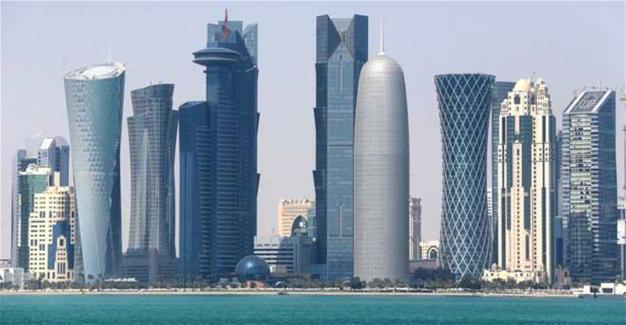Saudi-Egypt axis cuts ties to isolate Qatar
RIYADH / DOHA

A group of Arab nations led by Saudi Arabia and Egypt cut ties with Qatar on June 5, accusing the gas-rich Gulf country of supporting extremism, while a number of regional and global actors, including Turkey and the U.S., called for dialogue to resolve the dispute.
Bahrain, the United Arab Emirates, Yemen and the Maldives joined the duo in severing relations with gas-rich Qatar, accusing Doha of harboring “terrorist and sectarian groups that aim to destabilize the region including the Muslim Brotherhood, Daesh [Islamic State of Iraq and the Levant – ISIL] and al-Qaeda.”
Qatar reacted with fury, denying any support for extremists and accusing its Gulf neighbors of seeking to put the country under “guardianship.”
Qatar hosts the largest U.S. airbase in the region, which is crucial to operations against ISIL.
Ankara has urged dialogue and continued contacts between Gulf countries in a bid to resolve the unprecedented crisis, while expressing Turkey’s “sadness” over the incident.
“Dialogue should be continued under any condition so that problems can be resolved peacefully. We feel saddened by this current picture. We can give all sort of support for the normalization of the situation,” Foreign Minister Mevlüt Çavuşoğlu said at a joint press conference with German Foreign Minister Sigmar Gabriel.
Çavuşoğlu recalled that Turkey regards the “unity and togetherness” of the Gulf countries as equal to Turkey’s own unity, while underlining the need of solidarity of all regional countries in the fight against terror, radicalism and Islamophobia.
The Foreign Ministry issued a separate statement on the development. “Turkey, as a responsible actor in its region and as term president of the Organization of Islamic Conference, is ready to do its best for resolving this disagreement between friendly and brotherly countries as soon as possible,” read the statement.
Turkey and Qatar have improved their bilateral relations in recent years, including accelerated economic ties, which allowed the former to open a military base in Qatari territories.
Speaking in Sydney, U.S. Secretary of State Rex Tillerson said he did not expect the announcement to have “any significant impact, if any impact at all, on the unified fight against terrorism.”
He encouraged Qatar and its neighbors to “sit down together,” adding that Washington was ready for “any role that we can play” in helping to overcome divisions.
Iran issued a neutral statement on the crisis, urging Qatar and its neighbors to resolve their differences “through political and peaceful methods and dialogue between the parties.”
The announcement on June 5 came less than a month after U.S. President Donald Trump visited Saudi Arabia to cement ties with Riyadh and called for a united front among Muslim countries against extremism.
It also followed weeks of rising tensions between Doha and its neighbors, including Qatari accusations of a concerted media campaign against it and the alleged hacking of the Qatar News Agency.
The Gulf states and Egypt said they were severing diplomatic ties and closing transport links with Qatar, which relies on imports from its neighbors.
The Gulf states banned their citizens from travelling to Qatar and ordered Qatari citizens to leave within 14 days.
Saudi Arabia also closed its borders with Qatar, effectively blocking food and other supplies exported by land to Qatar.
Local media in Qatar reported there was already some panic buying as people stock up on food.
The Qatar Stock Exchange tumbled eight percent on opening and eventually closed down 7.58 percent.
Gulf states have for years accused Qatar of supporting extremist groups, in particular the Muslim Brotherhood, the world’s oldest Islamist organization.
Riyadh also accused Doha of supporting Iran-backed “terrorist activities” in Saudi Arabia’s Shiite-dominated area of Qatif, as well as in Bahrain, both of which have seen Shiite unrest in recent years.
Any suggestion that Qatar is backing the agenda of Shiite-dominated Iran - Sunni Saudi Arabia’s regional arch-rival - is especially sensitive, particularly in the wake of Trump’s comments last month.
Qatar has consistently denied any support for extremists or Iran and did so again on June 5.
“The measures are unjustified and are based on false and baseless claims,” the Qatari Foreign Ministry said in a statement.
“The aim is clear, and it is to impose guardianship on the state,” it said, insisting authorities would “take all measures necessary ... to foil attempts to affect or harm Qatar’s society and economy”.
Economic consequences were already emerging, with UAE carriers Emirates, Etihad, flydubai and Air Arabia, as well as Saudi Airlines, announcing the suspension of all flights to and from Qatar as of June 6.
Qatar Airways - one of the region’s busiest airlines - said it had suspended all flights to Saudi Arabia with immediate effect.
The Saudi-led coalition battling Iran-backed rebels in Yemen said it had expelled Qatar from the group.
The coalition accused Qatar of providing “support to [terrorist] organizations in Yemen,” the first time it has made such a claim.
Gulf countries previously recalled their ambassadors from Qatar in 2014, ostensibly over its support for the Muslim Brotherhood, but the moves on June 5 go much further.
 A group of Arab nations led by Saudi Arabia and Egypt cut ties with Qatar on June 5, accusing the gas-rich Gulf country of supporting extremism, while a number of regional and global actors, including Turkey and the U.S., called for dialogue to resolve the dispute.
A group of Arab nations led by Saudi Arabia and Egypt cut ties with Qatar on June 5, accusing the gas-rich Gulf country of supporting extremism, while a number of regional and global actors, including Turkey and the U.S., called for dialogue to resolve the dispute.